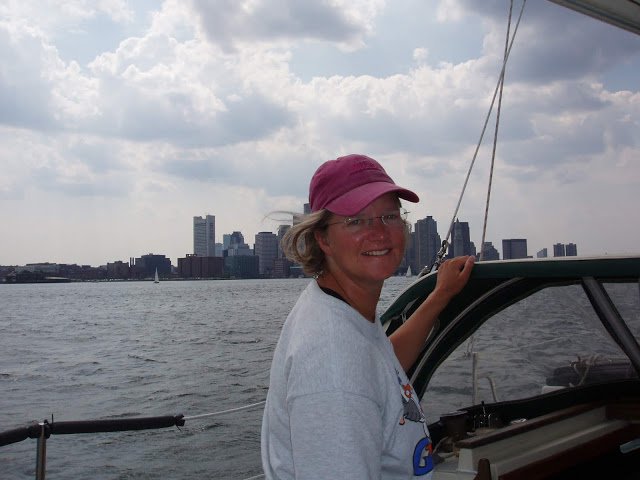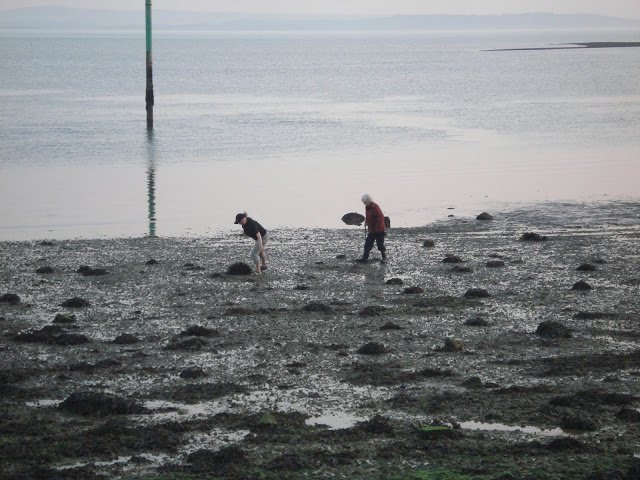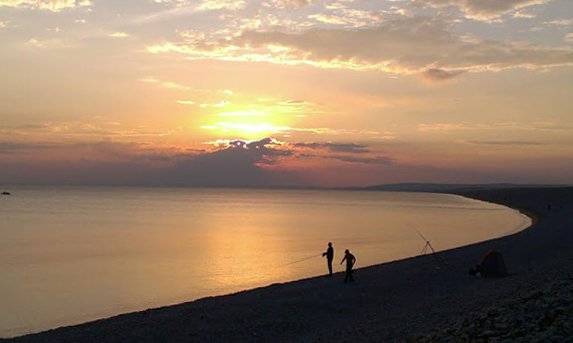
How I became a marine biologist
Charlotte Bolton, our Seasearch Co-ordinator, shares her journey to becoming a marine biologist...or, her "long and winding path to becoming an amateur squidge geek!"
My early life in the depths of the East Midlands, about as far from the sea as you can get, wasn’t auspicious in terms of signalling where I was eventually to end up, but did instil in me a deep love of nature and collecting ‘treasures’ in matchboxes. I grew up on a farm in South Leicestershire and spent my days out and about enjoying the freedom of the countryside.
We had traditional family holidays at the seaside and I clearly remember my fear of the lurking worms in the casts at Lepe on the Solent (some things haven’t changed; I’m still not at all keen on worms, eels and snakes and am guaranteed to use up my air very quickly diving a wreck with lurking congers…)

School wasn’t particularly high on my list of favourite things but I was a quietly rebellious bookish nerd even at a young age and found the arcane rules and regulations of lessons restrictive and boring. Fast-forward to secondary school, now slightly further south in Northamptonshire and the same applied – I can’t do three science ‘O’ levels? Really?! How ridiculous is that?
Fortunately I had a supportive biology teacher who gave me the material to work on at home, though eventually I chose to read chemistry at university – it all came very easily to me, apart from the lab work which mostly resulted in a lot of broken test tubes! I simply couldn’t translate the clean and tidy world of the theory into the mess that were my experiments…
King’s College London came to my rescue in offering a degree in Theoretical and Computational Chemistry – perfect! My final year undergrad project “Application of Lie Groups and Clifford Algebras to the Valence Bond Method” (no, it makes less sense to me now too!) led on to a PhD in radiation chemistry, looking at the theory of spin effects and lots of quantum mechanics – Professor Brian Cox without the stars, if you like. But it gave me the opportunity to travel and work in the United States and I spent two summers at the Radiation Laboratory of the University of Notre Dame, home of the famous Fighting Irish college football team.

I still wasn’t entirely sure what I wanted to do as a career but enjoyed exercising my brain (and people seemed prepared to pay me to do so…) and continued in research at the Medical Research Council Harwell Lab near Oxford, modelling the effects of radiation on biomolecules such as DNA.
Three years later and I was forced to conclude that I was not really cut out for a research career so took a sideways move into IT support 100 miles further east in the Fens – the Unilever Centre for Molecular Science Informatics at the University of Cambridge to be precise. Here I was responsible for all aspects of IT in this newly-built research centre – well-remunerated but very stressful…
Fortunately around this time I decided that I needed more water in my life, and learned to dive with Gozo Aqua Sports in Marsalforn, Gozo in 2002. Hindsight is wonderful – how I wished I’d done this years ago…! Diving and Gozo have been central to my life ever since.

A summer sabbatical of sailing in the north-east US hit another chord, but was ultimately a break from the reality of my parents both passing in quick succession and prompting a radical re-think on life…and a move to Southampton to indulge my love of the sea at last with a Masters in Ocean Sciences. All the jobs I had looked at either wanted a year of unpaid work in lieu of experience, or a Masters degree – no contest!

And so began a return to studenthood – a fabulous period not only for being based in the wonderful National Oceanography Centre but all the extra-curricular activities that took over all my spare time and more.
My overseas diving was somewhat curtailed by no longer being employed so I quickly learned to use a drysuit and got used to the cooler greener waters of home. I now do most of my diving in the UK and Seasearch has been an integral part of that transition. I can’t remember exactly where or when I first heard about the program (probably at the Dive Show in Birmingham?) What a brilliant idea!
As the one buried in the ID books at the dive centre straight after every dive, this was just what I was looking for! Nice slow bimbles followed by geeky discussions about what you’d seen on the dive… This is the thing I really love about Seasearch trips (though I admit we do sometimes come across as being a bit anorak-y…perhaps it’s the bags of collected seaweed or pots of unidentified ‘turf’?!).

An advert for Data and Survey Officer at Dorset Wildlife Trust, with part of the job being to co-ordinate Dorset Seasearch activities, convinced me to make the move from Cambridge in 2012. Sometimes you just have to up sticks and make the leap of faith.

Now I live 30m from the sea and even the storms of February 2014 weren’t a deterrent – it’s fascinating watching the beach change shape with every tide and listening to the waves crash onto the shingle. We used to holiday at Chesil Cove in the 1980s, and in many ways Portland hasn’t changed very much at all.

And so to the present… I took over from Chris Wood as National Seasearch Co-ordinator in 2016 and now spend too much time with budget spreadsheets and grant proposals, but with the added bonus of travelling round to meet all the co-ordinators and find out what’s going on in their patch. The high points of the job are generally when I am either involved in Seasearch survey dives as a volunteer, with other equally keen/mad (depending on the conditions) volunteers, or delivering talks and training courses to enthuse new people about coming and joining us.
I am proof that you don’t need to be a professional marine biologist, you just need enthusiasm for marine life, be keen to want to learn more about it and willing to give up your spare time to do so. The rewards come in the form of concrete, real-life conservation successes such as Marine Protected Areas or fishery byelaws based on your efforts (oh yeah, and the cake…!).

In 2018 we celebrated 30 years of Seasearch surveys under that name, which is a magnificent achievement and grand testimony to the dedication of all the people who’ve been involved in the program since then (and earlier – back to the 1970s and the Year of Underwater Conservation). I am exceedingly proud to be part of the ongoing Seasearch story…
If you want to find out more about Seasearch, please visit www.seasearch.org.uk.


